
Maurice Ernest Gibb was an English musician, singer, songwriter and record producer who achieved fame as a member of the Bee Gees. Although his elder brother Barry Gibb and fraternal twin brother Robin Gibb were the group's main lead singers, most of their albums included at least one or two songs featuring Maurice's lead vocals, including "Lay It on Me", "Country Woman" and "On Time". The Bee Gees were one of the most successful rock-pop groups of all time.

Cucumber Castle is the seventh studio album by the Bee Gees, released in April 1970. It was produced by Barry Gibb, Maurice Gibb, and Robert Stigwood. It consists of songs from their television special of the same name, which was named after a song on their 1967 album Bee Gees' 1st. Cucumber Castle is the only Bee Gees album not to feature any recorded contributions from Robin Gibb, as he had left the group before the album was recorded.

The Bee Gees Sing and Play 14 Barry Gibb Songs is the debut studio album by the Bee Gees. It was released in November 1965 on the Australian Leedon label. It is a compilation of most of the Gibb brothers' singles that had been released over the previous three years in Australia, which accounts for the many different styles of music on it.
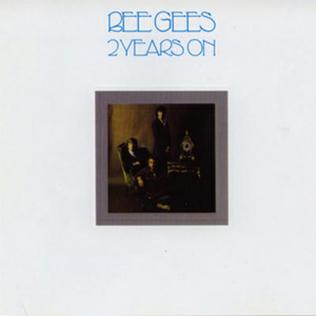
2 Years On is the eighth studio album released in 1970 by the Bee Gees, which reached No. 32 on the US charts, and sold 375,000 copies worldwide. The album saw the return of Robin Gibb to the group after an earlier disagreement and subsequent split following Odessa. 2 Years On was the first album with drummer Geoff Bridgford, who remained a full-time member of the group until 1972 although he was not pictured on the sleeve. The best-known track is "Lonely Days". Released as the first single by the reunited brothers, it charted high in the US, but peaked at No. 33 in the United Kingdom.

To Whom It May Concern is the tenth album by the Bee Gees. Released in October 1972, it is the follow-up to, and continues the melancholic and personal sound of, its predecessor Trafalgar. The album was recognised as "a farewell to the old Bee Gees" as the album marked the end of an era for the group in several ways: it was their last album to be recorded solely at IBC Studios, in London, their last with conductor and arranger Bill Shepherd, who had guided them since 1967, and their last under their first contract with Robert Stigwood. Some of the songs were old ones finished or rewritten for the occasion. To Whom It May Concern has sold approximately 350,000 copies worldwide.

Eaten Alive is the sixteenth studio album by American singer Diana Ross. It was first released by RCA Records on 24 September 1985 in the United States, with EMI Records distributing elsewhere. Primarily written and produced by Barry Gibb of the Bee Gees, with co-writing from his brothers Andy, Maurice, and Robin, the album also includes a contribution from Ross' friend Michael Jackson who co-wrote and performed on the title track.
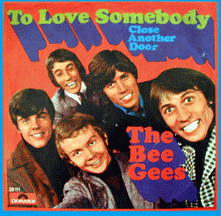
"To Love Somebody" is a song written by Barry and Robin Gibb. Produced by Robert Stigwood, it was the second single released by the Bee Gees from their international debut album, Bee Gees 1st, in 1967. The single reached No. 17 in the United States and No. 41 in the United Kingdom. The song's B-side was "Close Another Door". The single was reissued in 1980 on RSO Records with "How Can You Mend a Broken Heart" as its flipside. The song ranked at number 94 on NME magazine's "100 Best Tracks of the Sixties". It was a minor hit in the UK and France. It reached the top 20 in the US. It reached the top 10 in Canada.

"My World" is a 1972 single released by the Bee Gees. It was originally released as a non-album single on 14 January 1972 worldwide. but was later included on the compilation Best of Bee Gees, Volume 2 in 1973. The flip side of the single was "On Time", a country rock number composed by Maurice Gibb. "My World" reached the Top 20 in both US and UK.
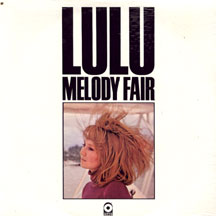
Melody Fair is an album recorded by Lulu in 1970 for a release on Atco Records. She had recorded her first album for Atco, New Routes, in the fall of 1969 under the production auspices of top Atlantic Records execs Jerry Wexler, Tom Dowd and Arif Mardin. Although New Routes had been a commercial disappointment, Wexler, Dowd and Mardin had Lulu record tracks for a follow-up album in March 1970 with virtually the same session personnel who had played on New Routes, although the latter album had been recorded at Muscle Shoals Sound Studio and the 1970 sessions were recorded at Criteria Studios in Miami.
"Bury Me Down By the River" is a song written by Barry and Maurice Gibb and recorded separately by the Bee Gees and P.P. Arnold. The Bee Gees' version was recorded in May 1969 at IBC Studios and released in April 1970 on the album Cucumber Castle.
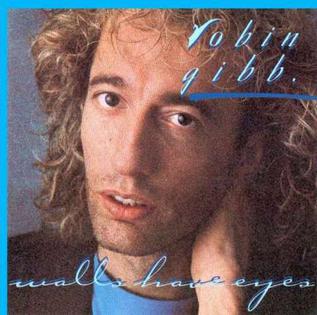
Walls Have Eyes is the fourth solo album released by singer Robin Gibb. It was released in November 1985 on EMI America Records in the US and Polydor Records throughout the rest of the world, and produced by Maurice Gibb and Tom Dowd. The two singles from the album, "Like a Fool" and "Toys", did not chart in the US and UK. Gibb did not release a solo album in eighteen years until 2003 with Magnet. Unlike Secret Agent which contains dance numbers, this album contains mostly ballads.
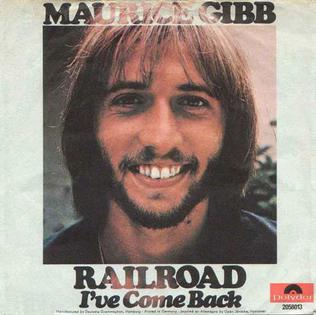
"Railroad" is the first solo single released by Maurice Gibb, best known as a member of the Bee Gees. It was released in April 1970. Like the Bee Gees' songs from 1967 to 1972, the single was released by Polydor in most parts of the world while in the US and Canada it was released by Atco. In Canada it was also released by Atlantic and Cotillion. Gibb did not release a follow-up single until 1984 when he released "Hold Her in Your Hand".
The Loner is an album recorded in late 1969 by Maurice Gibb of the Bee Gees, but never released. An album master was compiled on 14 November 1970 although it would remain unreleased. Bootleg releases with the same title collect additional recordings unrelated to this album.
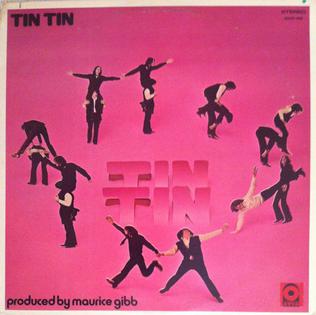
"Tin Tin" is the first studio album by the Australian group Tin Tin, produced by Maurice Gibb.
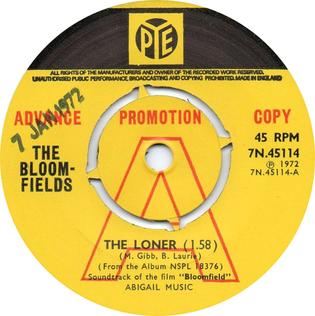
"The Loner" is a song written by Maurice Gibb and Billy Lawrie and originally included on Gibb's The Loner which was not released, although British rock band The Bloomfields covered the song and their version was released internationally, featuring a lead vocal of Billy Lawrie and Maurice Gibb, with Gibb on guitars and bass. They recorded this song for the film Bloomfield, but the film was called The Hero in America. The song starts with a drum fill. Gibb and Lawrie sang together in harmony on the line I'm a loner. On the record, Billy Lawrie was credited as 'B. Laurie'.
"Sweetheart" is a song released by the Bee Gees, released as the B-side of "I.O.I.O." in March 1970. and released on the album Cucumber Castle in April 1970.
"Evening Star" is a song written by Barry and Maurice Gibb, and recorded by American country music artist Kenny Rogers. It was released in June 1984 as the third single from the album Eyes That See in the Dark. The song reached No. 11 on the Billboard Hot Country Singles & Tracks chart.
The Fut was a British rock group formed in London in 1969, consisting of Maurice Gibb, Steve Groves, Steve Kipner and Billy Lawrie. Their only single was "Have You Heard the Word", released in the UK on Beacon Records. This was the first time since the formation of the Bee Gees that Gibb, who was still in the group, had performed with other group without them. Groves and Kipner was originally from Tin Tin.

"Have You Heard the Word" is a song recorded by British rock group The Fut. Written by Steve Kipner and Steve Groves. It is the band's only single. Most of the vocals were sung by Maurice Gibb, the rest were sung by Kipner and Groves. The B-side "Futting" was only an instrumental. This song features an impersonation of John Lennon by Maurice. It was released as a single on 7 March 1970 but did not chart.

"Eyes That See in the Dark" is a song written by Barry and Maurice Gibb in 1982. It was performed by Kenny Rogers for his 1983 album of the same name. It reached #30 in the US Country Charts, #4 in the US Adult Contemporary Charts, #61 in the United Kingdom and #79 in the Billboard Hot 100.














